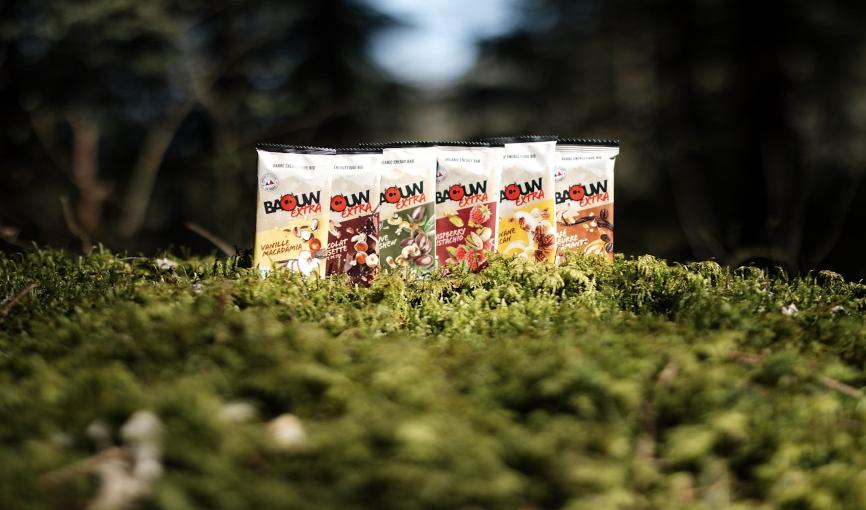At Baouw, we often refer to our products as ‘your cereal bars’. Probably out of habit. Well, maybe we'd like to: when you eat cereals, you generally feel like you're eating healthily. You're doing something good for your body and your health...
But in reality, that's not true. You're not doing your body any good when you eat cereals. And that's why they should be called ‘Baouw (NOT) cereal bars’! After all, our Baouw energy bars contain... no cereals at all. And we obviously have good reasons for not using them. Here are some straightforward explanations that should interest you...
Raison n°1 / Les barres de céréales NE SONT PAS OPTIMALES
Les barres de céréales mettent en péril l’équilibre acido-basique, quelle que soit la nature de la céréale. Ces barres de céréales classiques entraînent souvent des phénomènes de fermentation dans le système digestif et sont donc difficiles à digérer. Il est donc conseillé d’en limiter la consommation, et de favoriser des aliments alcalinisants.
For sportspeople: doing a lot of sport can also have acidifying effects on the body. During sustained effort, the body becomes more acidic, so it's not a good idea to eat products that will exacerbate this phenomenon. So a big, fat NO to cereal bars during exercise.
Raison n°2 / Les barres de céréales sont riches en gluten
Cereal bars are often rich in gluten (except those made from rice and/or millet), which promotes intestinal inflammation.
‘Gluten is often poorly tolerated by the body. And the worst thing is that we don't necessarily realise it, the disease sometimes progresses silently, without symptoms’ warns Benoît Nave, Baouw nutritionist. Even if you're not intolerant or sensitive, gluten during exercise doesn't go down well. And neither do cereal bars. ‘The intestine is already weakened by sporting activity (from the 10th minute of exercise, there is an increase in intestinal permeability!) and loses its ability to break down molecules as complex as today's gluten correctly’.
‘Gluten consumption (and a pro-inflammatory diet in general, including cereals in particular) can weaken the mucosa and encourage an increase in intestinal permeability.
Autant de raisons de bien lire les listes d’ingrédients et en fonction du type de céréales, de réduire sa consommation de ce type de barres au besoin.
Reason n°3 / Yes, most classic bars contain cereals. But refined cereals at that!
The cereals found in cereal bars are :
- soit des céréales raffinées et affichent alors un indice glycémique élevé. « Elles vont donc provoquer une augmentation du taux de sucre dans le sang, poussant le pancréas à secréter de l’insuline pour abaisser ce taux, ce qui résulte souvent par… un coup de pompe un peu plus tard, en réaction ! » explique notre coach nutritionniste. Ça te parle ce coup de fatigue après un repas un peu riche ? Une barre de céréales raffinées industrielle agit de la même façon sur ton organisme… Ça fait réfléchir, n’est-ce pas ?
- soit des céréales non raffinées, et leur fibres, difficiles à digérer.
Reason n°4 / Refined cereal bars? Empty calories!
Refined cereals provide nothing from a nutritional point of view. They contain little or no vitamins or minerals. They only provide carbohydrates (and not the best ones) and... that's it.
From a nutritional point of view, it's much better to stick to a paleo diet (fruit, dried fruit, oilseeds, etc.), with few cereals and lots of ‘full’ calories. Density is health!
Reason n°5 / These bars contain cereals... and everything in between!
If you look closely at the composition of most cereal bars, you'll find: glucose syrup, palm oil, dextrose, emulsifier, rice syrup, etc. Not very natural, is it? Not very natural, is it? This is not the case for all cereal bars, but it is important to read their composition carefully before consuming them.
So why do we find cereals in sports bars (and others too, for that matter) if they're not good for you?
The answer is... Cereals are cheap! Of course it is! The primary objective of some companies is not nutritional richness, but ‘richness’ pure and simple. And the cheaper the product, the higher the margin... Yes, traditional industrial cereal bars are cheaper than Baouw bars, and that's normal: At Baouw, we've chosen to use organic dates and other organic fruits such as cherries and blackcurrants as the basic ingredients in our bars, rather than cereals, to provide quality carbohydrates with a moderate glycaemic index.
Full calories at a cost, with the added benefit of being nutritionally dense and really energetic. ‘We don't sell water and air. Because we've chosen oilseeds that are far more nutritious than cereals (pistachios, almonds, cashews, etc.) and noble ingredients (Espelette chilli, hibiscus, gentian, lime, etc.). Because everything is organic. Because we sell a product that takes a lot of time to research and develop. We've thought through every detail to meet stringent nutritional and flavour specifications’, says Gilles Galoux, founder of Baouw, who has teamed up with nutritionist Benoît Nave and 2-star Michelin chef Yoann Conte to come up with cereal bars... without cereals!








